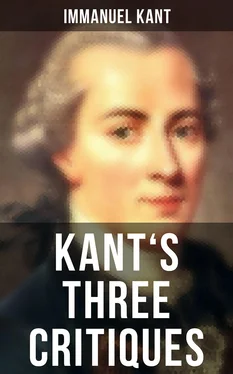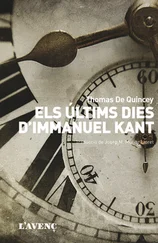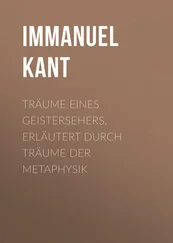This leads us to inquire why it is that, in metaphysics, the sure path of science has not hitherto been found. Shall we suppose that it is impossible to discover it? Why then should nature have visited our reason with restless aspirations after it, as if it were one of our weightiest concerns? Nay, more, how little cause should we have to place confidence in our reason, if it abandons us in a matter about which, most of all, we desire to know the truth — and not only so, but even allures us to the pursuit of vain phantoms, only to betray us in the end? Or, if the path has only hitherto been missed, what indications do we possess to guide us in a renewed investigation, and to enable us to hope for greater success than has fallen to the lot of our predecessors?
It appears to me that the examples of mathematics and natural philosophy, which, as we have seen, were brought into their present condition by a sudden revolution, are sufficiently remarkable to fix our attention on the essential circumstances of the change which has proved so advantageous to them, and to induce us to make the experiment of imitating them, so far as the analogy which, as rational sciences, they bear to metaphysics may permit. It has hitherto been assumed that our cognition must conform to the objects; but all attempts to ascertain anything about these objects a priori, by means of conceptions, and thus to extend the range of our knowledge, have been rendered abortive by this assumption. Let us then make the experiment whether we may not be more successful in metaphysics, if we assume that the objects must conform to our cognition. This appears, at all events, to accord better with the possibility of our gaining the end we have in view, that is to say, of arriving at the cognition of objects a priori , of determining something with respect to these objects, before they are given to us. We here propose to do just what Copernicus did in attempting to explain the celestial movements. When he found that he could make no progress by assuming that all the heavenly bodies revolved round the spectator, he reversed the process, and tried the experiment of assuming that the spectator revolved, while the stars remained at rest. We may make the same experiment with regard to the intuition of objects. If the intuition must conform to the nature of the objects, I do not see how we can know anything of them a priori . If, on the other hand, the object conforms to the nature of our faculty of intuition, I can then easily conceive the possibility of such an a priori knowledge. Now as I cannot rest in the mere intuitions, but — if they are to become cognitions — must refer them, as representations, to something, as object, and must determine the latter by means of the former, here again there are two courses open to me. Either, first, I may assume that the conceptions, by which I effect this determination, conform to the object — and in this case I am reduced to the same perplexity as before; or secondly, I may assume that the objects, or, which is the same thing, that experience, in which alone as given objects they are cognized, conform to my conceptions — and then I am at no loss how to proceed. For experience itself is a mode of cognition which requires understanding. Before objects are given to me, that is, a priori , I must presuppose in myself laws of the understanding which are expressed in conceptions a priori . To these conceptions, then, all the objects of experience must necessarily conform. Now there are objects which reason thinks, and that necessarily, but which cannot be given in experience, or, at least, cannot be given so as reason thinks them. The attempt to think these objects will hereafter furnish an excellent test of the new method of thought which we have adopted, and which is based on the principle that we only cognize in things a priori that which we ourselves place in them. 5
This attempt succeeds as well as we could desire, and promises to metaphysics, in its first part — that is, where it is occupied with conceptions a priori , of which the corresponding objects may be given in experience — the certain course of science. For by this new method we are enabled perfectly to explain the possibility of a priori cognition, and, what is more, to demonstrate satisfactorily the laws which lie a priori at the foundation of nature, as the sum of the objects of experience — neither of which was possible according to the procedure hitherto followed. But from this deduction of the faculty of a priori cognition in the first part of metaphysics, we derive a surprising result, and one which, to all appearance, militates against the great end of metaphysics, as treated in the second part. For we come to the conclusion that our faculty of cognition is unable to transcend the limits of possible experience; and yet this is precisely the most essential object of this science. The estimate of our rational cognition a priori at which we arrive is that it has only to do with phenomena, and that things in themselves, while possessing a real existence, lie beyond its sphere. Here we are enabled to put the justice of this estimate to the test. For that which of necessity impels us to transcend the limits of experience and of all phenomena is the unconditioned, which reason absolutely requires in things as they are in themselves, in order to complete the series of conditions. Now, if it appears that when, on the one hand, we assume that our cognition conforms to its objects as things in themselves, the unconditioned cannot be thought without contradiction, and that when, on the other hand, we assume that our representation of things as they are given to us, does not conform to these things as they are in themselves, but that these objects, as phenomena, conform to our mode of representation, the contradiction disappears: we shall then be convinced of the truth of that which we began by assuming for the sake of experiment; we may look upon it as established that the unconditioned does not lie in things as we know them, or as they are given to us, but in things as they are in themselves, beyond the range of our cognition. 6
But, after we have thus denied the power of speculative reason to make any progress in the sphere of the supersensible, it still remains for our consideration whether data do not exist in practical cognition which may enable us to determine the transcendent conception of the unconditioned, to rise beyond the limits of all possible experience from a practical point of view, and thus to satisfy the great ends of metaphysics. Speculative reason has thus, at least, made room for such an extension of our knowledge: and, if it must leave this space vacant, still it does not rob us of the liberty to fill it up, if we can, by means of practical data — nay, it even challenges us to make the attempt. 7
This attempt to introduce a complete revolution in the procedure of metaphysics, after the example of the geometricians and natural philosophers, constitutes the aim of the Critique of Pure Speculative Reason. It is a treatise on the method to be followed, not a system of the science itself. But, at the same time, it marks out and defines both the external boundaries and the internal structure of this science. For pure speculative reason has this peculiarity, that, in choosing the various objects of thought, it is able to define the limits of its own faculties, and even to give a complete enumeration of the possible modes of proposing problems to itself, and thus to sketch out the entire system of metaphysics. For, on the one hand, in cognition a priori , nothing must be attributed to the objects but what the thinking subject derives from itself; and, on the other hand, reason is, in regard to the principles of cognition, a perfectly distinct, independent unity, in which, as in an organized body, every member exists for the sake of the others, and all for the sake of each, so that no principle can be viewed, with safety, in one relationship, unless it is, at the same time, viewed in relation to the total use of pure reason. Hence, too, metaphysics has this singular advantage — an advantage which falls to the lot of no other science which has to do with objects — that, if once it is conducted into the sure path of science, by means of this criticism, it can then take in the whole sphere of its cognitions, and can thus complete its work, and leave it for the use of posterity, as a capital which can never receive fresh accessions. For metaphysics has to deal only with principles and with the limitations of its own employment as determined by these principles. To this perfection it is, therefore, bound, as the fundamental science, to attain, and to it the maxim may justly be applied:
Читать дальше












